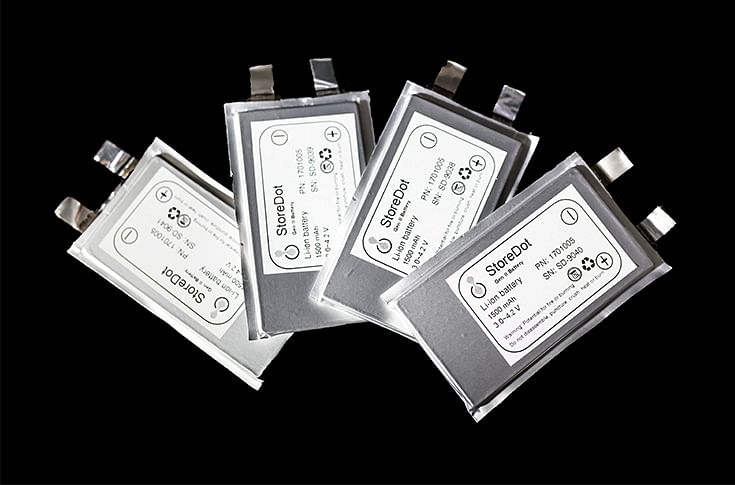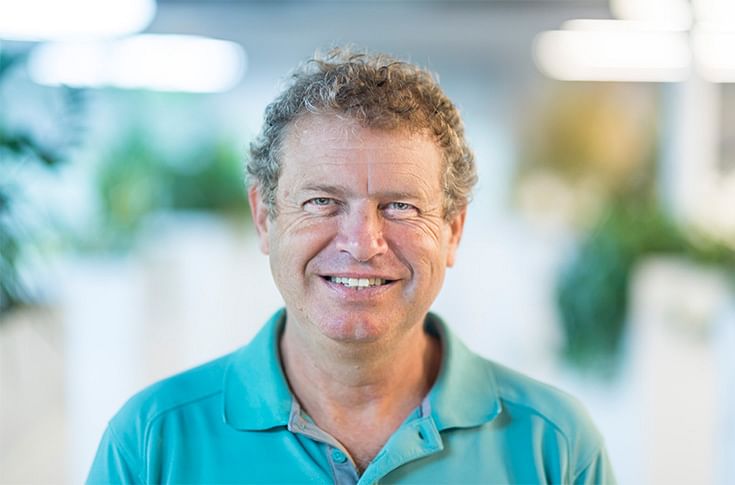StoreDot’s breakthrough battery tech promises a full charge in 5 minutes!
Israeli energy company begins trial production of its ultra-fast-charging lithium-ion batteries. Could this battery propel India’s target of achieving mass-scale EV adoption?
While most EV makers seek to solve the problem of increasing the mileage per charge, StoreDot is focusing on fast-charging electric vehicles in just minutes — a solution all EV drivers can relate to.
Despite strong advancements in multiple technologies aimed at extending range for electric vehicles, the key challenge of a high charging time still remains one of the most crucial factors that determine higher adoption of the eco-friendly vehicles.
While some consider the cost of EV batteries to be the tipping point that will help drive sales momentum for EVs, the crux of the matter especially for developing countries like India, where the consumer still remains pessimistic about leaving his/her vehicle overnight in charging mode, a solution perhaps could be right around the corner.
Israel-headquartered StoreDot a leading player in the field of extreme fast charging (XFC) battery technology, has announced the availability of its first-generation five-minute charge battery engineering samples. This, the company says, represents a significant milestone in its mission to eliminate the range and charging anxiety of EVs, demonstrating the commercial viability of its XFC batteries for the first time via a small form-factor battery cell.
The company, founded in 2012, is working on creating the next-generation of lithium-ion batteries that can be recharged in a matter of minutes, bringing EVs on par with their ICE-engined counterparts where tanking up on fossil fuels takes just a few minutes.
StoreDot will be releasing the first production batch of sample cells, which is targeted at showcasing the technology to potential EV and industry partners. This first-generation battery was used to demonstrate the full charge of a two-wheeled EV in just five minutes for the first time and can offer ultra-fast charging to a number of other industries, such as commercial drones and consumer electronics.
The first-generation engineering samples demonstrate to EV OEMs and battery makers the successful replacement of graphite in the cell's anode using metalloid nano-particles — a key breakthrough in overcoming major issues in safety, battery cycle life and swelling.
In an exclusive interaction with Autocar Professional, Dr Doron Myersdorf, founder and CEO, StoreDot, revealed what led to the company’s inception. “I was looking into exciting research in Tel Aviv University around new organic materials and their potential in semiconductors and energy storage,” which led to the foundation of StoreDot’s patented technology. The company has already invested around $80 million (Rs 592 crore) towards developing the XFC batteries.
Race for ultra-fast-charging
During the early years, StoreDot had its focus on reducing the charging time for cellphone batteries, an area similar to that of the present EV market. While, there have been significant developments in the lithium-ion-dominated cellphone battery market, the EV market still awaits a robust proven technology that can enable speedy transition and take away EV charging woes.
StoreDot has received several patents for its development on the lithium-ion battery tech. What’s more, the company has garnered interest from several leading names in the automotive industry like BP, Daimler, TDK Corporation and Samsung Ventures. Dr Myersdorf says the idea is to “work with the entire ecosystem to advocate the XFC solution. Their market visibility and guidance support us in taking the technology to market.”
It maybe recollected that in 2019, StoreDot and BP showcased a lithium-ion powered two-wheeler that's fully chargeable in five minutes. Commenting on the feat, Dr Myersdorf had said, “By using a two-wheel electric vehicle from Torrot, we have demonstrated the transformative potential of this technology for the first time in a real-life application, which will be applied to four-wheel EVs in the future. This is an important milestone for the industry, and we will continue to evolve our technology in close collaboration with our partner BP to help in EV adoption.”
Backing the company, Jon Salkeld, technology director for BP’s AMU had said, “Ultra-fast charging is at the heart of BP’s electrification strategy, which is why we invested in StoreDot. This demonstration proves that an ultra-fast charging world will soon be possible and supports our goal of helping to create the infrastructure and collaboration framework required to facilitate a wider global technological shift to electric vehicles.”

A pack comprising hundreds of EV FlashBattery cells can store enough energy for a full EV range on a 5-minute charge. For a 480km car, it translates to 100km range on a one-minute charge.
Mass production on existing lithium-ion setup
One of the bigger concerns for the auto industry for any new technology is the huge investment and a newer setup that is generally required to facilitate fulfilling the demand. But StoreDot’s technology is expected to be just “5-10 percent more expensive due to the nano-structure” than the existing lithium-ion batteries in the market.
“Our materials cost structure should be at par with the market. However, due to our nano structure particles, we might initially see some cost addition in the range of 5-10 percent. As we scale in volume this adder will be eliminated,” explains Dr Myersdorf.
Furthermore, StoreDot has an established partnership with EVE Energy, a Chinese lithium-ion battery maker that supplies lithium-ion batteries for electric cars to earphones. The company is said to be the fifth largest supplier to the Chinese EV market, and already has a supply pact with Daimler.
StoreDot is looking to leverage the battery manufacturing capacity of EVE Energy, as the XFC batteries are designed to be produced on existing lithium-ion production lines at EVE Energy. The samples are compliant with UN 38.3, which ensures the safety of lithium-ion batteries during shipping.
When queried about the manufacturing capacity, Dr Myersdorf says, “Since EVE has already significant manufacturing capacity, we currently see no capacity limitations. This is exactly what our proprietary technology is all about, to solve this challenge. These samples prove that was thought impossible to do is actually possible and scalable in traditional manufacturing lines.”
With the company’s demonstration paving the way for a potential disruption, the Indian automotive industry may very well look to benefit from StoreDot’s battery disruption. Plug in for regular updates.
Interview Dr Doron Myersdorf, CEO, StoreDot

By when do you expect to begin commercial production?
StoreDot has the following commercialisation milestones:
Gen2 Silicon prototype: End of 2021.
Gen2 integration into vehicle: End of 2022.
Start of mass production: End of 2023 (for 2025 model).
Cars in volume on the road: Early 2025
Do StoreDot batteries require a different charging infrastructure?
Not different but with higher power, like any fast-charging solution.
How do you view the global and Indian electric vehicle market?
We will let the EV OEMs decide what their EV penetration strategy will be. However, there’s no doubt that the main decision factor will be the maturity of the charging infrastructure.
StoreDot’s battery tech looks quite promising and can help mass-scale adoption of EVs especially in the two- and three-wheeler segments. Any plans to enter India?
Currently we are focused on the EV market. Two- and three-wheelers are not our immediate focus but surely, we will explore this market opportunity in the future. The main barrier and challenge would be the charging infrastructure.
What are your thoughts on other electrification products such as solid state batteries, sodium-ion batteries, super capacitors and hydrogen fuel-cells?
We believe that solid-state is a path to increase the energy density (we call it XED) and safety properties of the cell. However, this technology will only be available in 5-7 years and has its limitations — mainly the need for extensive capex investment to manufacture / mass produce.
This feature was first published in February 1 2021 of the AutocarProfessional Magazine.
RELATED ARTICLES
Beyond Cars: VinFast's Full-spectrum EV Push in India
With $2 billion committed, VinFast is constructing an integrated play spanning cars, scooters, buses, ride-hailing and c...
A Breather for Hero
A combination of policy tailwinds, new products and Honda’s cautious approach on EVs put a stop to the constant encroach...
Renault India's Quiet Fixer
As the head of Renault India, Francisco Hidalgo Marques faces his biggest challenge yet.






 15 Feb 2021
15 Feb 2021
 2854 Views
2854 Views





 Kiran Murali
Kiran Murali




